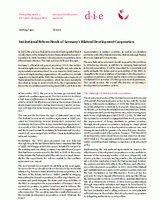Institutional reform needs of Germany’s bilateral development cooperation
Ashoff, GuidoBriefing Paper 8/2009
Bonn: German Development Institute / Deutsches Institut für Entwicklungspolitik (DIE)
In 2005, the previous Federal Government had signalled that it would improve the linkage between financial and technical cooperation to make Germany’s development cooperation more efficient and effective. This had not been followed through. Germany’s official development assistance (ODA) has institutional strengths and weaknesses. Its strengths are, inter alia, its representation at cabinet level, its own ministry (BMZ) and experienced implementing organisations. Its weaknesses include capacity constraints at the BMZ, the institutional complexity of financial and technical cooperation, which has been repeatedly described as being in need of reform by the Organisation for Economic Cooperation and Development (OECD), deficits in the representation in partner countries, as well as coordination problems with other federal ministries that increasingly finance their own bilateral ODA activities. The new Federal Government should respond to the problems by introducing reforms. In addition to merging financial and technical cooperation, it will be important to concentrate and partly delegate the duties and responsibilities of the BMZ, to strengthen the representation of Germany’s development cooperation in partner countries and to improve the coordination of bilateral ODA activities of other government departments. This would increase the overall effectiveness of Germany’s development cooperation system.

